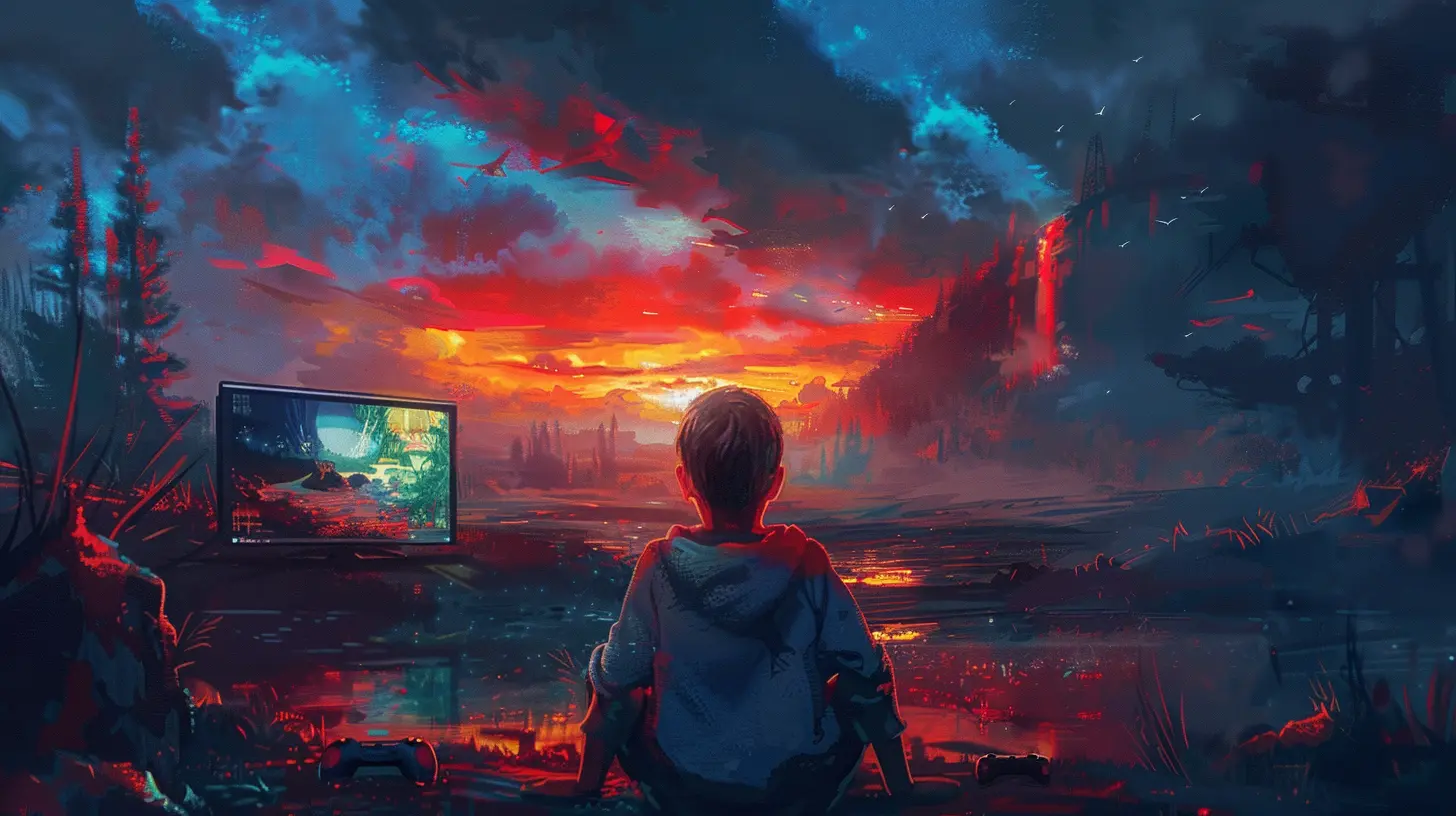The Role of Narrative-Driven Games in Today's Gaming Landscape
15 August 2025
Gaming isn't just about shooting bad guys, scoring goals, or leveling up anymore. Oh no, my friend, it’s so much more than that. These days, it’s all about stories—heart-pounding, tear-jerking, mind-boggling stories woven into gameplay that keep us hooked for hours on end. Welcome to the era of narrative-driven games, where the plot isn't just a backdrop; it’s the very backbone of the experience.
Let’s take a deep dive into why narrative-driven games are dominating today’s gaming landscape and why players (like you and me!) keep coming back for more. 
What Are Narrative-Driven Games?
Okay, before we rush into the nitty-gritty, let’s define what we’re talking about. Narrative-driven games are basically video games that focus heavily on storytelling. Think of it like this: if most games are summer blockbusters with explosions galore, narrative-driven games are those Oscar-winning films that leave you sobbing into your popcorn. They’re immersive, emotional, and thought-provoking.And guess what? They come in all shapes and sizes. From open-world RPGs like The Witcher 3: Wild Hunt to indie tearjerkers like Life is Strange, these games deliver experiences that feel less like “just a game” and more like journeys you’d gladly lose yourself in. 
Why Stories in Games Matter
Remember when games were just about high scores? Pac-Man didn’t have much of a backstory, did he? (Unless you count “eat dots, avoid ghosts” as compelling lore.) But nowadays, gamers want more than just flashy graphics and challenging mechanics—they want to feel something.Here’s why stories matter so much in games:
1. They Make Us Care
Think about it. Would you really care about defeating that big final boss if you didn’t know why you’re fighting them in the first place? Games with strong narratives give us reasons to care. They build characters we grow attached to, worlds we want to protect, and conflicts that stir up all the feels.When a game like Red Dead Redemption 2 makes you weep for an outlaw’s redemption arc, you know it’s doing something right. It’s not just about winning—it’s about the emotional journey you go through to get there.
2. They Stick in Our Heads
Ever finish a game and then think about it for weeks after? That’s the power of a great story. A compelling narrative lingers in our minds like the lyrics of a catchy song. It makes the experience memorable, turning a few hours of screen time into something truly unforgettable.Take The Last of Us, for instance. Years after playing, fans are still discussing its storytelling, characters, and moral dilemmas. That’s not just a game; that’s storytelling magic.
3. They Offer Escapism with Depth
Let’s be real—we all love a bit of escape from reality. Narrative-driven games provide that escape but with a twist. Instead of just being mindless fun, they give us something to sink our teeth into.Playing a game like Disco Elysium isn’t just about solving a mystery; it’s about unpacking deep philosophical ideas, exploring human nature, and questioning your own decisions. It’s escape, sure—but it’s the kind that leaves you thinking long after you’ve put down the controller. 
The Unique Appeal of Narrative-Driven Games
So what’s the secret sauce that makes narrative-driven games so irresistible? Let’s break it down.1. Player Agency: Being the Main Character
One of the best things about narrative-driven games is that you get to be the protagonist. It’s not like a movie where you’re passively watching someone else’s story unfold. Nope. In these games, your choices matter, and your actions drive the plot forward.Games like Mass Effect even let you shape the story based on your moral decisions. Are you a paragon of justice or a rogue troublemaker? It’s entirely up to you. How cool is that?
2. Immersive Worlds
Narrative-driven games pull you into their worlds like nothing else. Whether you’re hunting griffins in The Witcher 3’s sprawling countryside or uncovering ancient secrets in Horizon Zero Dawn, every detail feels meticulously crafted to draw you in.It’s like opening the pages of a well-written book—but better, because you get to live it.
3. Emotional Connection
Let’s face it—these games know how to tug at your heartstrings. They introduce you to characters you root for, love, or even despise. And when something happens to them? Oh boy, the waterworks.Who didn’t feel a pang of guilt in Undertale when they accidentally killed Toriel? Or straight-up bawl their eyes out at the end of Journey? Narrative-driven games have the power to make us feel, and that’s what keeps us hooked. 
How They’re Shaping the Future of Gaming
Now, here’s the fun part: narrative-driven games aren’t just popular—they’re reshaping the entire gaming industry.1. Blurring the Line Between Games and Movies
Have you noticed how cinematic some games are these days? That’s no coincidence. With jaw-dropping visuals, talented voice actors, and gripping stories, narrative-driven games are becoming more like interactive movies.Take God of War (2018), for example. It’s not just a game—it’s an emotional rollercoaster wrapped in stunning visuals and epic combat. Hollywood, your move.
2. Opening Doors for Indie Developers
Here’s the thing: you don’t need a massive budget to tell a great story. Indie developers are proving this time and time again with incredible narrative-driven games like Celeste and Oxenfree. These games might not have blockbuster visuals, but their storytelling more than makes up for it.As a result, more indie titles are thriving in the gaming scene, giving players even more heartfelt, unique experiences to enjoy.
3. Expanding What Gaming Can Be
Narrative-driven games are pushing boundaries and redefining what video games can achieve. They’re not just entertainment anymore—they’re art. They’re platforms for storytelling, emotional expression, and even social commentary.Titles like Papers, Please challenge us to think about moral dilemmas, while games like Hellblade: Senua's Sacrifice bring attention to mental health issues. It’s storytelling with a purpose, and it’s amazing to see.
The Challenges Facing Narrative-Driven Games
Of course, nothing’s perfect, right? While narrative-driven games are absolutely incredible, they do have their challenges.1. Balancing Gameplay and Story
Sometimes, the story is so good that it overshadows the actual gameplay. And let’s be real—no one wants to sit through a 20-minute cutscene every five minutes. The trick is finding that sweet spot where gameplay and story work hand-in-hand.2. Replayability
Here’s the downside of a strong narrative: once you know the story, the magic can fade a bit on a second playthrough. Developers are tackling this with branching storylines and multiple endings, but it’s still a tricky obstacle to overcome.Wrapping It Up: Why We Love Narrative-Driven Games
At the end of the day, narrative-driven games are more than just games—they’re experiences. They’re our escape routes, our emotional outlets, and sometimes, even our mirrors. They make us laugh, cry, and reflect, all while keeping us completely engrossed.So, whether you’re battling gods in God of War, solving mysteries in Firewatch, or shaping the fate of the galaxy in Mass Effect, know this: you’re part of a storytelling revolution that’s changing the gaming world forever. And isn’t that freaking awesome?
all images in this post were generated using AI tools
Category:
Gaming NewsAuthor:

Tayla Warner
Discussion
rate this article
2 comments
Solenne McLaughlin
Great read! Narrative-driven games truly elevate the gaming experience, blending storytelling with gameplay. Can't wait to see what’s next in this genre!
February 5, 2026 at 4:20 AM

Tayla Warner
Thank you! I’m glad you enjoyed it. Narrative-driven games really do transform our gaming experiences, and I’m excited to see where the genre goes next!
Misty Walker
Stories ignite our passions!
August 25, 2025 at 2:36 AM

Tayla Warner
Absolutely! Narrative-driven games elevate the gaming experience, immersing players in rich storytelling that fuels their passion and emotional connection.


